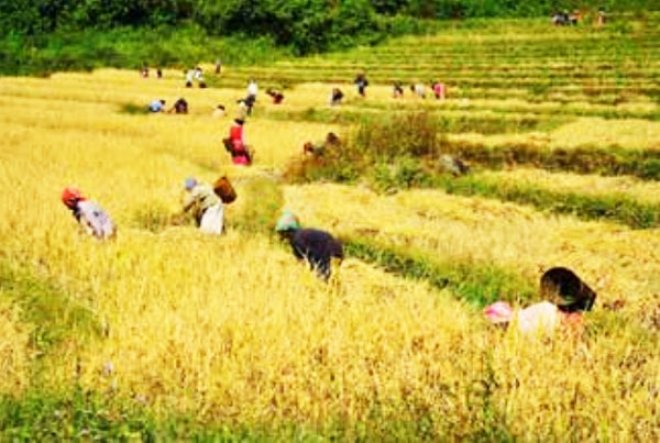An organic farming project in Kachin State is helping people displaced by war to get back on their feet.
Every day, hundreds of people at the Hnkawng Pa camp for internally displaced people near the Chinese border leave their makeshift shelters and head for the plots where they grow vegetables.

In 2011, when fighting resumed in Kachin State, many people fled their villages and took refuge in hastily established IDP camps controlled by the Kachin Independence Organization. Many had lost family members and most of their possessions and having to flee their homes was traumatic. Adjusting to life in the camps was also a radical change. The villagers were accustomed to living in small, tight-knit communities and they found themselves in overcrowded camps with strangers as neighbors. An unfamiliar environment, boredom and a lack of work opportunities led to strains in the social fabric of these Kachin Christian camp communities.
Now, however, growing pumpkins and other vegetables is providing many IDPs with much-needed nourishment and vitamins and helping them regain their self-esteem by giving them a sense of mission.
“This is why our program is good,” says Hkwa Lwi from the local Kachin NGO called BRIDGE or Bridging Rural Integrated Development and Grassroots Efforts that is helping in the camps. “It not only provides food to the refugees but it also recreates a sense of purpose and community,” he said.
Food security remains a problem in most of the 30 IDP camps administrated by the KIO, where most of the 80,000 IDPs survive on a basic food package of oil, salt and rice that is brought in over the border with China or provided by humanitarian agencies. Most IDPs don’t have enough vitamins and proteins to sustain them. The fortunate few who have found work on nearby farms usually spend the 50 Chinese Yuan they earn each day to buy vegetables to feed their families.
But for more and more of the camp residents, the organic gardening scheme launched by Bridge is helping Hnkawng Pa camp residents to feed their families and making them feel better about themselves.
A total of 10 groups, each comprised of 20 to 30 families, are working together after being trained by BRIDGE in the craft of organic, sustainable farming. After an introductory course in land management, they are taught how use natural fertilizers and select the best seeds for an optimal harvest. Since April, 11 tons of fresh vegetables have been harvested, enough to supply the whole camp. Lentils, ginger, onions, pumpkins and cucumbers are tended by the groups when they are not busy with community service in the camp. Rice remains the only commodity that needs to be imported from outside as the limited local production is only used during the Thanksgiving and Christmas celebrations of this Christian community.
The NGO began the program soon after the camp was set up two years ago but it was slow to be taken up at first. The KIO camp administrator says today that it is, “thanks to the sustainable farming that the community survives.” Initially, most of the IDPs thought their plight would be temporary because they are used to leaving their villages for periods of up to six month to avoid fighting before returning to their homes. But as the fighting continued and hopes of a quick return vanished, many camp residents showed interest in joining the program.
Dau Hawng, the local BRIDGE NGO program manager, says the skills and knowledge acquired by the IDPs who are participating in the program will be useful when they eventually return home. Most of the displaced people have expressed the wish to return to their villages and put the skills they learned in the camps to use, once a ceasefire is in place. “Next year we will start to prepare bags of seeds containing different varieties of vegetables that the people have learned to cultivate so they can take them back home,” he said, hoping the sustainable methods of farming will spread to other areas of Kachin State.
Bridge’s approach to agriculture is innovative in a region where natural resources are being depleted on a large scale and where most farmers have adopted Chinese agricultural techniques which involve using costly industrial fertilizers and pesticides. The NGO’s efforts have sparked interest from nearby farmers who have asked to be trained in organic agriculture after observing the potential of these new ways of farming. The KIO says it wants to replicate the program in the other 30 camps it manages.
In recent decades, many farmers have been lured by the promise of good yields offered by modern industrial agricultural techniques that often rely on the heavy use of fertilizers, pesticides and herbicides. Bridge’s organic approach provides a cheaper, more sustainable and healthier alternative.
With the approach of Thanksgiving, a Christian event which originated in North America and will be celebrated in the United States this year on November 28, there are more immediate concerns than spreading the word about these new, but old-style, methods of growing food.
As one of the farmers strolled earlier this month around the plot he has been cultivating for the past year, he pointed proudly to the pumpkins and other vegetables.
“In three weeks, we will pick all these vegetables and make a great Thanksgiving feast for everyone in the camps,” he said.



